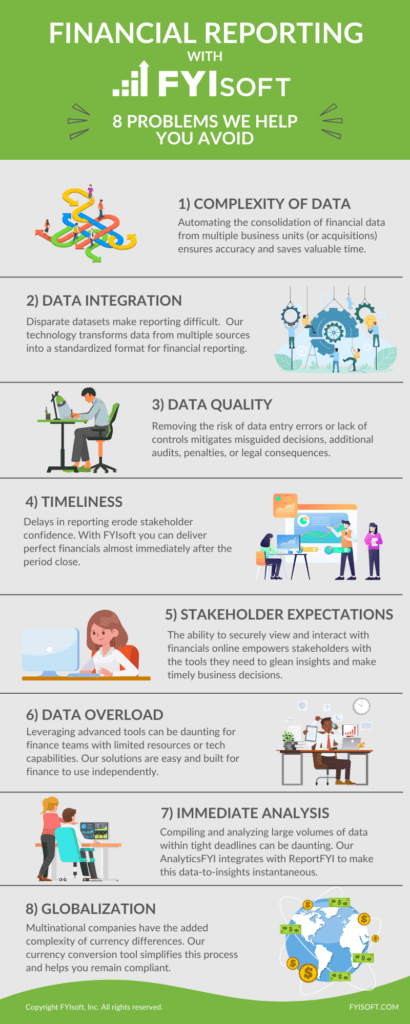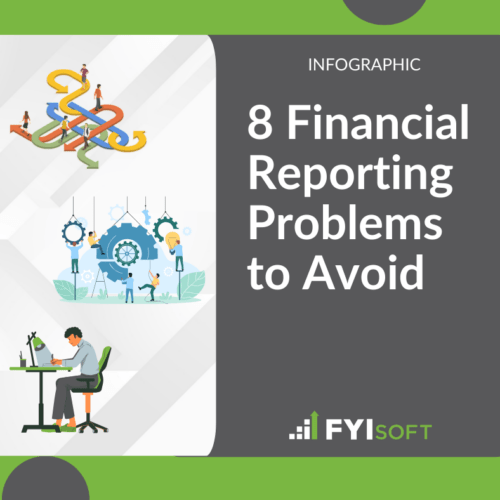Financial reporting refers to the process of preparing and presenting financial information about a company’s performance and financial position to external stakeholders, such as investors, creditors, regulators, and the general public. The discipline typically involves the preparation of financial statements, including at a minimum the income statement, balance sheet, and statement of cash flows.
Financial reporting problems can have a significant impact on the financial close process. As companies continually strive to deliver better information faster, financial reporting is one key area that stands in the way of achieving this goal – particularly for companies with complex reporting needs.
As complexity increases, the opportunity for errors also exponentially increases – and these errors can be costly. FYIsoft’s cloud financial reporting software, ReportFYI®, was designed to help these types of companies mitigate this risk. This article explores many of the potential problems that CFOs avoid with ReportFYI.
Avoid These 8 Financial Reporting Problems
1. Complexity of Data
As companies grow, the complexity and volume of financial data they generate can become overwhelming. This can lead to challenges in consolidating data from various sources and ensuring accuracy. Examples include:
- Multiple Business Units: In a large corporation with multiple business units, each unit may generate its own set of financial data. Consolidating this data to present a holistic view of the company’s financial health can be challenging, especially if each unit uses different accounting systems or practices.
- Mergers and Acquisitions: When companies undergo mergers or acquisitions, CFOs must integrate financial data from the acquired entities into their existing reporting systems. This involves reconciling differences in accounting methods, harmonizing financial policies, and ensuring compliance with regulatory standards.
- Large Volume of Data: Companies with high transaction volumes, such as retail chains or financial institutions, generate vast amounts of financial data on a daily basis. Processing and analyzing this data to extract meaningful insights for decision making can be time-consuming and resource-intensive.
2. Data Integration
CFOs may face challenges in financial data consolidation from multiple sources, such as different business units, subsidiaries, or acquired entities. Ensuring consistency and accuracy across these disparate datasets can be difficult, particularly if they use different accounting systems or standards.
The adoption of new technologies such as cloud computing, big data analytics, and artificial intelligence can both simplify and complicate financial reporting. While these technologies offer opportunities for automation and efficiency, they also introduce new challenges related to data integration, data security, and regulatory compliance.
3. Data Quality Issues
Inaccuracies or inconsistencies in financial data can arise due to errors in data entry, software glitches, or inadequate controls over financial processes. Maintaining the integrity and accuracy of financial data is crucial. Errors or inaccuracies in financial reporting can result in misinformed decision making, damaged reputation, and potential legal liabilities. CFOs must address data quality issues, such as errors in data entry, incomplete or missing data, and discrepancies between different data sources.
4. Timeliness
Financial reporting deadlines, such as quarterly and annual reports, must be met to satisfy stakeholders and regulatory bodies. Delays in reporting can erode investor confidence and may lead to penalties or legal consequences. FYIsoft customers consistently reduce their reporting time 50% or more, as seen in our case studies.
5. Stakeholder Expectations
CFOs must balance the sometimes conflicting expectations of various stakeholders, including investors, regulators, analysts, and internal management. Meeting the needs of these diverse groups while maintaining transparency and integrity in financial reporting can be challenging. FYIsoft’s powerful report distribution and drill-down features are a favorite among our customers and their stakeholders alike.
6. Data Overload
Leveraging advanced analytics tools and technologies for financial analysis can be daunting, especially for organizations with limited resources or technological capabilities. CFOs may need to invest in training or seek external expertise to harness the full potential of these tools. Because FYIsoft’s solutions are extremely easy to use and enable finance teams to work quickly and independently, we can help you avoid the delays and costs associated with IT or consulting assistance.
7. Immediate Analysis
Simply presenting financial data is not sufficient; CFOs must also provide meaningful analysis and insights to aid decision making. This requires the ability to interpret complex financial information and communicate key findings effectively to various stakeholders. However, compiling and analyzing large volumes of data within tight deadlines can be challenging, particularly if manual processes are involved. Our fully integrated AnalyticsFYI instantly transforms reporting data into visual dashboards for this very reason.
8. Globalization
For multinational companies, financial reporting becomes more complex due to differences in accounting standards and the need for currency conversion. CFOs must navigate these complexities to ensure accurate and compliant reporting.
Overall, FYIsoft’s financial reporting software offers numerous benefits that help CFOs avoid the financial reporting problems addressed in this article. Our software enhances the efficiency, accuracy, compliance, and effectiveness of a company’s financial reporting processes. Schedule a demo for a personalized tour and see what FYIsoft can do for you.


